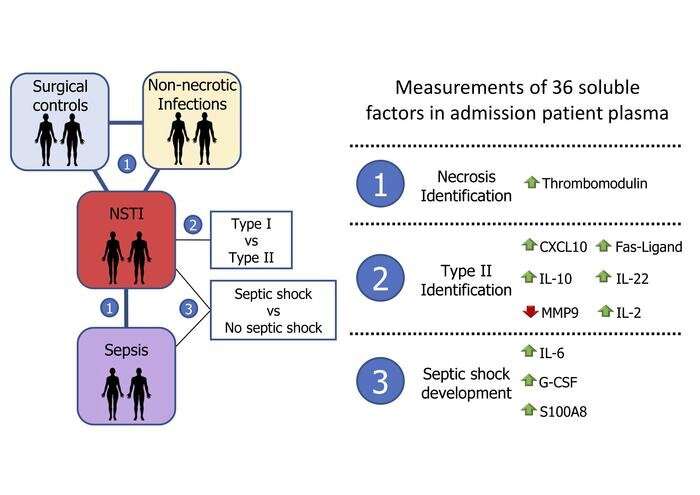
Rapid diagnosis is crucial in bacterial soft tissue infections to reduce the risk of severe injury or amputation. Vague symptoms and a heterogeneous patient group increase the risk of misdiagnosis. Researchers at Karolinska Institutet and other research institutions have now, with the help of AI, identified a new and very promising biomarker. The study, published in the Journal of Clinical Investigation, may have implications for both diagnosis and treatment.
“There are currently no tools for safe, rapid diagnosis in life-threatening soft tissue infections. Our findings are consequently very interesting as the biomarkers identified are possible candidates for improved diagnostics. The results are also relevant for individualized treatment in the future,” says Anna Norrby-Teglund, Professor at the Department of Medicine, Karolinska Institutet (Huddinge) and the study’s last author.
Necrotising soft tissue infections (NSTI) are bacterial infections characterized by rapid tissue degradation. These infections, often caused by streptococci, are relatively uncommon but extremely serious, in most cases requiring intensive care and may quickly become life-threatening.
Extensive surgery, intravenous antibiotics and sometimes even amputation are often required to prevent the infection from spreading. Many patients also develop sepsis, which further complicates the course of the condition.
Early, correct diagnosis is crucial to save lives and avoid amputation, but this is complicated by factors such as vague symptoms including vomiting, fever and severe pain, as well as the heterogeneous group of patients. Despite recommendations for surgical evaluation in suspected NSTI, there is a considerable risk of misdiagnosis.
Need for biomarkers
Currently, various laboratory tests, including the number of white blood cells, are used as diagnostic tools, but these are low-sensitivity techniques. There is therefore a clear need to identify biomarkers that are specific to NSTI. The condition is classified into four types depending on the infecting organism.
Researchers at Karolinska Institutet, Haukeland University Hospital, Norway, and Copenhagen University Hospital, Denmark, have now been able to identify biomarkers specific to different patient groups with soft tissue infections.
Analysis with AI
Using machine learning, a type of artificial intelligence, the researchers analyzed 36 soluble factors in blood plasma from the 311 NSTI patients included in the international INFECT study. Control groups included patients with suspected NSTI and sepsis, respectively.
The analyses showed a new biomarker that identifies patients with tissue necrosis to a considerable degree of accuracy.
Source: Read Full Article





